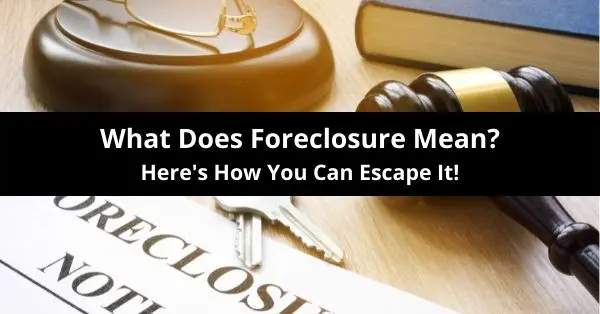
Foreclosure means that a lender has begun the process to take possession of a borrowers’ home after the borrower has defaulted on multiple, consecutive monthly mortgage payments. Once the foreclosure process begins, the borrower will have a limited period to either repay their debt, sell the home on their own, or face eviction before or once the home is sold.
However, foreclosure does not mean that you will lose your house and walk away with nothing.
You see foreclosure is not uncommon, and most lenders understand that financial hardships can impact your ability to meet your monthly payments. In addition, foreclosure can be very expensive for your lender, so they most likely want to reach a solution to avoid foreclosure as quickly as possible.
As much as foreclosure can be stressful, it can also be an opportunity to walk away from a bad investment and on to greener pastures. In order to walk away from foreclosure with your house or money in your pocket, it is important to understand the steps of foreclosure.
The Steps of Foreclosure
There are typically four stages of foreclosure that you will need to be aware of so that you have sufficient time to reach a solution so that you can avoid being foreclosed on.
-
1st Payment Default
Your lender will contact you if you miss one of your mortgage payments. At this stage, your lender may work with you to come up with a plan to make up your missed payments. -
Notice of Default
Your lender will issue a notice of default after about three missed mortgage payments (this differs between lenders). A notice of default signals that the process of foreclosure has officially begun. At this stage, you will have two to three months, depending on the lender, to come up with a solution that will get your home out of foreclosure. -
Notice of Trustee’s Sale
If you and your lender do not reach a solution for your missed payments, then your lender will issue a notice of trustee’s sale, where your home will be sold at public auction. By law this will be advertised in a local newspaper at least once a week, for three consecutive weeks. You still have up to five days before the auction to reach a solution with your lender before foreclosure. -
Public Auction
If no solution can be reached before the date of the public auction, then your home will be sold to the highest bidder. You may be able to bid on your home during the auction, but you will have to have a cash deposit on hand to make a qualifying bid.
In many cases, the process of foreclosure could take as little as 2-4 months from the initial notice of default to complete the home’s sale. During this time, you will be able to come up with a plan to get out of foreclosure or walk away with your home without losing everything.
4 Ways to Avoid Foreclosure
There are multiple ways to avoid foreclosure. Here are four of the most common and likely easiest ones to help you avoid being foreclosed on.
Work Out a Payment Plan
The simplest way to avoid or reverse the foreclosure process is to make up for your missed payments. Your lender might be amenable to a payment arrangement that makes up for any missed payments as long as you can prove that you can meet your monthly payments moving forward. This is an excellent option if you have experienced a temporary financial hardship and wish to keep your home.
Sell Your Home
On the other hand, if you cannot meet your monthly payments or just want to walk away, then you can sell your house for cash to a “we buy houses” company like ours, on your own to avoid foreclosure altogether. Selling your home late into foreclosure can be tricky as time is not on your side. Because time is tight, it is recommended to reach out to an experienced real estate investor like us or real estate agent that specializes in foreclosure homes.
While wholesaling may be appealing, this process can take longer than selling a home directly to an investor as the wholesaler is buying your home to then sell to an investor like us for a markup. The benefit with the wholesaler is that they have connections already, the downside is you lose time, which is something you likely do not have.
Seek Forbearance
Loan forbearance allows you to temporarily delay your monthly payments so that you can save up money to repay that debt eventually. It’s important to note that when you exit forbearance, you will be responsible for all of the payments you delayed, plus your continuing monthly payments.
This option will allow you to keep your home but is only recommended if you can pay off the amount of money you didn’t pay during the forbearance in one lump sum or as part of a monthly payment plan.
Apply for Loan Modification
You can also try requesting a loan modification. A loan modification operates very similarly to loan refinancing. Loan modifications allow you to alter the terms of your loan agreement to help you meet your monthly payments.
For example, a loan modification may allow you to extend the length of your loan to reduce your monthly payments and help them become more affordable. This method could help you keep your house and potentially find a way to make it more affordable
Foreclosure happens to millions of people each year, and it is not your fault if you’re facing it. We all fall behind on our bills and you do have a way out. The easiest way to escape foreclosure is to sell your house fast to a reputable home buyer. If you’d like a quote on yours or are simply curious, call us at (877) 804-5252.

